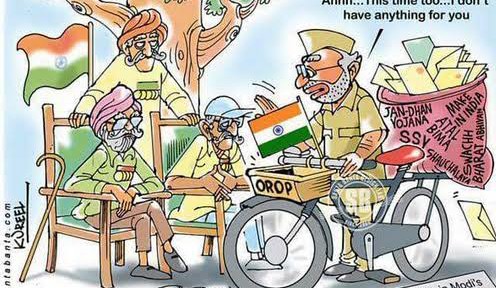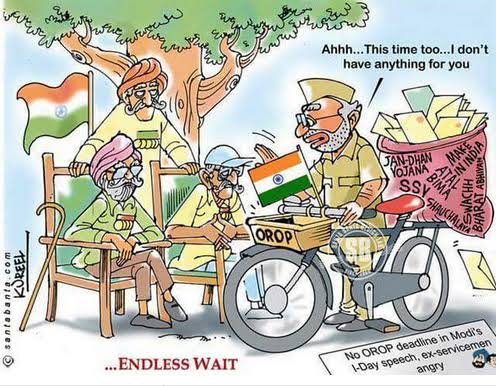Armed forces are called uniformed services. Many uninformed (not the opposite of uniformed) people feel that they are called so only because of the uniform that they wear: olive-green for the army, white for the navy and the sky blue for the air-force. Of course, that’s right but it is only a small part of the uniformity obtained in the services. The major part is to do with the uniformity of training, operations and responses. What it then boils down to is that, a uniformed person, in dress and in every other sense, is a disciplined person with as standard or near standard responses to situations as possible.
We Indians are as far from being uniformed or disciplined as possible. We are creative in our responses and approach, which makes us destructive in our outlook. The best example to understand this is our traffic sense or more aptly: traffic non-sense. Continuing in one lane for anything more than a few seconds gets on our nerves and mars our creativity and sense of adventure. So we leave the relative safety of our lane and venture out in other lanes or in-between areas to see if we can speed up things a bit. From experience we know that it doesn’t help. But, so sure we are of our traffic skills that rather than experience teaching us, we can teach the bally experience a thing or two.

In India, therefore, we offer lip-service to the services and publicly (because of the acute sense of jingoism that we possess, something which can only be called Indianness) extol their discipline and sense-of-purpose. However, privately we hate their guts for being what they are. And that’s precisely the reason why in our country there is so much of chasm between the society and the armed forces. Any number of WhatsApp forwards, for example, tell us how abroad the politicians, bureaucrats and general public have deep respect for their armed forces; but, here in India no one gives a damn.
Here is, therefore, a fantasy (nightmare). After having made relentless abortive attempts so that some of the civilians in our country, if not the majority, would become like the uniformed armed forces, the armed forces decide to follow the dictum when in Rome do as the Romans do. Politically, it doesn’t mean to follow Sonia Gandhi; it simply means that the armed forces decide to adopt the civilian ways of doing things. Here are some of the scenarios thought of by my creative mind:
Scenario I
Kargil War II
CO: We have received orders to capture the Tiger Hill….
Officer1 (Cutting him short): I know, Sir, that Tiger is our national animal and all that. However, too much focus on one animal, to the exclusion of others, is not good. The PM has shown Lion as the prominent symbol of Make in India. Why can’t we go and capture Lion Hill?

Officer2 (Cheerfully): Simply because there is no Lion Hill anywhere in the vicinity.
Officer1 (Not giving up so easily; no Indian ever does): That’s no excuse. What’s the use of ‘Make in India‘ campaign if we can’t even make a Lion Hill? Lets make one, Sir (this is said with the same resolve as the one employed by a passenger with the railway conductor to somehow find him a seat even though he has no reservation but merely a heavy wallet).
CO (Straightway seeing a flaw in this. Even though these days COs are elected rather than selected, he is quick to see this flaw): But, for us to capture Lion Hill, the enemy should have occupied it.
Officer3 (Dismissing this as something insignificant): That’s hardly a problem, Sir. If we can do match-fixing in cricket right in front of thousands of people sitting in the stadium, here it shouldn’t be any problem. Let me call my friend Abbas on the cellphone and ask them if they are willing to occupy a fictional Lion Hill so that we can evict them in return for our first occupying and then being evicted from the Markhor Hill.
CO (Reaching a quick decision; people in the higher echelons are adept at quick decisions): Alright guys, we shall capture Lion Hill and make a report to the HQ that Tiger Hill wasn’t occupied and hence we had no choice but to capture Lion Hill.
2nd-in-Command (Understanding his duty well and with determination; they are paid to do precisely this): I think I should get on with the citations for the gallantry awards after the successful match-fixing – sorry – successful operations.
Scenario II
Somewhere in the Arabian Sea (Renamed Bhartiya Samundra after the Modi government took up the issue at the United Nations)
Signal Communication Officer (SCO) (To CO on the Bridge of a warship): Sir, on the Tactical Primary we have just got a signal asking us to proceed on course 270 at a speed of 14 knots.
CO (with a chuckle): Splendid (the standard response of acknowledging messages by saying Very Good has been done away with long time back and now officers use all kinds of adjectives. Only the other day, on the communication circuit, instead of asking for ‘Say again your last’, someone got the brain-wave (at sea you get all kinds of waves) of using the more creative “mukarrar”. The South Indian communication operator on the other end responded to it by a safe, “Same to you, over”), I was expecting it. Can we quickly check up with the quartermaster in the wheelhouse and engineers in the engine room if they have any objection to it. I must carry everyone along.
Quartermaster in the Wheelhouse on the Conning Intercom: I overheard that, Captain Sir. I am from Delhi and must advise against this politically incorrect course. You see, Sir, probably the Fleet Commander has forgotten about the fact that today is an odd day and courses and speeds must conform with Kejriwal’s odd day directives. I would suggest steering 269 or 271 until midnight at least.
Machinery Control Room: Captain Sir, I have called a meeting of all concerned to ask we can do 14 knots and for how long. With the staggered lunch timings of between 1 to 3:30 PM, I hope to have an answer by about 4 PM. We are at it, Sir, and we shall inform you if we can proceed at 14 knots. Else, we shall suggest to you the speed that we can do.
CO: Beautiful, lovely, remarkable. What I love about this ship is the spirit. I wouldn’t be surprised if we eventually get the Most Spirited Ship trophy this year. I mean, just look at it this way: it has been less than ten minutes since we were asked to steer course 270 and proceed at 14 knots and already we are about to take a decision whether we can do it or not. Many of my engine room sailors would probably have to let go of their siesta. But, for us, the country comes first, the ship next and our own welfare last. Alright, SCO, make a signal to the Fleet Commander that by about 1615 hrs today we shall let them know what course and speed we would be doing.
SCO: Never mind Sir, they have cancelled their last order and are asking for suggestions as to what course or courses the Fleet should do.

Scenario III
Fly-Past for the Republic Day Parade
Commentator: For the last about nine and half hours we have been witnessing smart march-past by the smartly dressed soldiers, sailors and airmen. The nine and half hours were required due to jawans trickling in as and when they had time to do so. But, it is still better than last year when the 26th January parade spilled over to 27th January. The Department of Diversity and LGBT has given the first prize to a sailor who came dressed as a banana (he nearly added: the fruit that describes best the present state of our armed forces). And now we are all expecting the grand-finale of Fly-past by the IAF aircraft that would appear at the end of the Raj Path or any other path as is hereinafter mentioned. Please keep your eyes glued for the aircraft in all kinds of possible directions. It is as much a surprise for them as for you.
Commentator (after much wait): And now as you can see, one lone aircraft has appeared over the horizon. And what do we see? It is a commercial flight that has been re-routed safely over the Raj Path since the IAF planes are going all over the place. We may actually see more commercial flights over this route……ah, here is another….and hold your breath….this one is from Pakistan, which should have flown over Islamabad on 14th Aug but is competing with IAF in creativity.

Scenario V
The Aftermath
As the modern young officers, men and women of the three services have all become more non-uniformed, independent-minded and independent-actioned, there is a small bunch of veterans sitting in the most uniformly disciplined manner and chanting slogans in unison. These are the men and women who are still protesting against the anomalies in OROP and the recommendations of the Seventh Pay Commission. An old, wrinkle-faced, former Major General of the Indian Army, raises a feeble hand high in the air and screams: Sadda haq (Our right).
And a few dozen veterans, equally feeble, respond weakly but with determination and in unison: Ithe’ rakh (Keep it here).
They are the last of the men and women who have any kind of faith and pride in being uniformed and disciplined.

Post-Script
By the way, the Roget’s Thesaurus gave me the following antonyms of Uniform:
- disorderly
- flexible
- pliable
- pliant
- soft
- unmethodical
- unsystematic
- yielding
- abnormal
- broken
- changeable
- changing
- corrupt
- different
- dishonest
- disloyal
- eccentric
- imbalanced
- inconsistent
- inconstant
- intermittent
- irregular
- rough
- uncommon
- unconventional
- uneven
- unfair
- unfixed
- unstable
- unsteady
- untrustworthy
- unusual
- variable
- varying
- wobbly
- deviating
- dissimilar
- divergent
- unalike
- unlike
- varied











































































